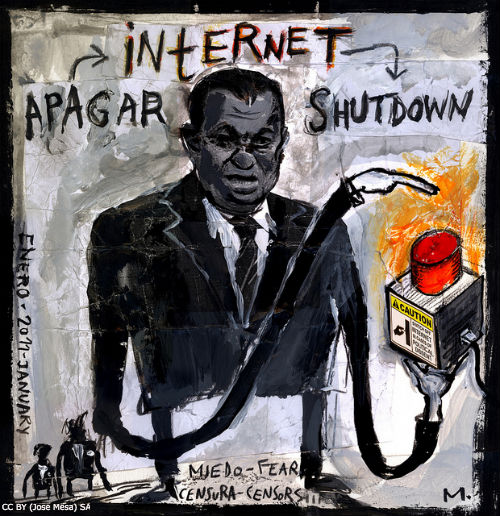Addressing the ultimate form of cybersecurity control: the “Internet kill switch” and the national security provisions
by Digital Rights LAC on August 28, 2014
This practice colloquially known as a “shut down of the Internet” or “Internet kill switch,” which could be easily considered as the “ultimate form of control” over the Internet infrastructure, has not only been considered or used by dictatorial regimes.
By Patricia Vargas León*
In January 2009, Egypt vanished from the online world during the protests of Tahrir Square for nearly six days. Later on, it would be known that this was a government action to stop the communication between protesters who demanded democratic changes in and out of Egyptian territory. However, the Egyptian government justified its actions under the auspices of national security, a concept broadly interpreted and far from being clear.
This practice colloquially known as a “shut down of the Internet” or “Internet kill switch,” which could be easily considered as the “ultimate form of control” over the Internet infrastructure,has not only been considered or used by dictatorial regimes, such as Egypt, Syria, Libya or China (Dunn, 2011).Since 2009, this practice also has been considered by well consolidated democracies such as the United States of America and the United Kingdom (Hardings, 2011; Opderbeck, 2012), and hybrid regimes, such as Venezuela (Infobae, 2014), always on behalf of the national security.
The expression “Internet kill switch” has been defined as a unique point of control to “shut down” the Internet and therefore to stop all Internet activity (Johnson, 2011). However,such thing, as a unique point of control to stop the Internet activity does not exist and the 100% of success shutting down the Internet is very unlikely. Nevertheless, the Internet can be seriously affected by this type of practice. Whoever wants to shut down the Internet or attempts to do it, has to control Internet service providers (ISPs), Internet exchange points (IXPs) and have access to the fiber optic cables.
Independently of the case under analysis, there is a common element common to all cases, which is the existence (or potential existence) of a national security threat, an inherent concept to the survival of nation-states, the main entities within the international realm.Taking this information into account, these numbers about the practice of shutting down the Internet give us a panoramic view of what is going on at a worldwide level:
1. Since 2005, eight authoritarian regimes, one full democracy and one hybrid regime attempted to shut down the Internet with different levels of success.
2. Between 2011 and 2013, two democratic and one hybrid regime considered to shut down the Internet (OpenNet, 2013)
This situation should not only put under debate questionable government practices, it also should consider future implications over multiple variables:
1. Theright of freedom of expression: by shutting down the Internet, the right of freedom of expression may be directly or indirectly affected, whether this is the government´s intention or not.
2. The conceptualization of the Internet (as a tool, constitutional right or civil liberty): an entity is protected by the law according to what that entity is. Therefore, here we have a problem of conceptualization: what is the Internet? Is it a tool? Is it a right? Or is it a tool that should have constitutional protection as long as it guarantees the right? This is important because according that answer, there will be a specific level of government protection. If it is constitutionally protected, Internet shut downs are not supposed to happen.
3. Impact over national economies by having the Internet down for an unknown period of time: the Egyptian economy resisted 6 days with a 30% of Internet penetration rate; how much would resist other economies? What would be the impact of one economy with the Internet down, such as the USA, oversmall or dependent economies?
4. Impact on the multistakeholder model of Internet governance: traditionally the Internet governance has been distributed among different stakeholders such as academia, civil society and the private sector. This model main goal is to keep the Internet infrastructure free of a centralized control. Contrary, shutting down the Internet implies a high concentration of power in one authority.How is it possible to conciliate these two models? What are the implications of a shut down policy over the multi-stakeholder model?
All these questions refer to specific problems generated by an Internet shut down. The main issue is however, how much political rights, economic development and Internet policies are subordinated to something call “national security”, a reason often cited,but never explained.
* Patricia A. Vargas-Leon, PhD candidate. School of Information Studies, Syracuse University.
Email: pavargas@syr.edu
http://my.ischool.syr.edu/People/pavargas
http://www.researchgate.net/profile/Patricia_Vargas-Leon?ev=hdr_xprf






